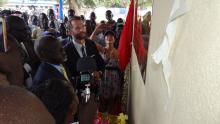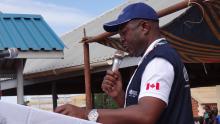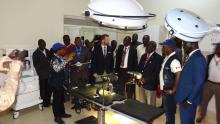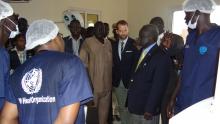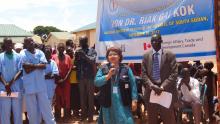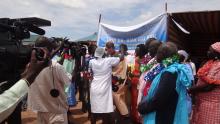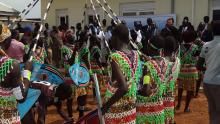WHO with funding from the Government of Canada inaugurates newly constructed maternity complexes in Awiel and Kuajok
19 September 2017, Juba – As part of its efforts to ensure the delivery and utilization of quality comprehensive emergency obstetrics and newborn care services in hospitals in South Sudan, the World Health Organization (WHO) with support from the Government of Canada through the Department of Foreign Affairs, Trade and Development (DFATD) has inaugurated the newly constructed fully-equipped maternity complexes in Aweil, former Northern Barh el Ghazal State and Kuajok, former Warrap State.
The new maternity complexes were officially opened by Honorable Dr Riek Gai Kok, Minister of Health, Republic of South Sudan, accompanied by the Governors of the two States in the presence of the Canadian Ambassador to South Sudan, Director Generals from line ministries, the WHO Representative a.i., the acting Undersecretary Ministry of Health, Members of the National Parliament and WHO South Sudan Staff among others.
During the opening ceremony, Dr Kok commended the ongoing commitments of the Government of Canada and WHO towards accelerating the reduction of maternal and newborn mortality in the country. He also urged all women to make use of these state of the art facilities.
WHO has been implementing a comprehensive emergency obstetric and neonatal care project (CEmONC) in the country since 2011 to improve access, quality utilization and 24/7 service availability of CEmONC. Through the project, WHO also constructed four maternity complexes in Bor, Yambio, Wau and Torit with emergency and delivery rooms, gynecological ward, operating theatres and maternity wards.
“The CEmONC project has been very critical for the provision of life-saving interventions for maternal and child health services in South Sudan”, said Mr Evans Liyosi, WHO Representative a.i. to South Sudan. Since the inception of the project, infant and child mortality rates declined from 102 to 60 and 135 to 105 per 1 000 live births respectively. The country has also witnessed a drastic reduction in maternal mortality from 2 054 per 100 000 live births to an estimated 780 per 100 000 live births, Mr Liyosi underscored.
WHO has also deployed international obstetricians and gynecologists as well as midwives to provide emergency and life-saving interventions, while building the capacity of middle level and allied health workers in basic emergency obstetric and new born care, equipping them to provide the needed services to the community and accelerate the reduction of maternal and infant mortality in South Sudan. Through the project, WHO granted scholarships to 18 South Sudanese medical doctors to further their studies in obstetrics and gynecology.
Over the last six years (2011-2017), the project reached over 110 000 direct beneficiaries with emergency obstetric and newborn services, averted over 37 000 maternal deaths by providing prompt and quality treatment of obstetrics complications. In addition, over 150 high-risk women have been accommodate in the maternity homes and provided with lifesaving emergency obstetric services.
The Canadian Ambassador to South Sudan His Excellency Alan Hamson, congratulated WHO’s efforts for the achievement made in this first Canadian funded project to provide 24 hours obstetric emergencies services aimed at improving the lives of mothers and children in South Sudan despite the challenging circumstances encountered. “We look forward to these maternity complexes becoming centres of excellence”. H.E. the Ambassador appealed to the government to take more responsibility and increase budget allocation to health and education.
On behalf of the beneficiary community of Awiel, Ms Tresa Akout Athian, appreciated the support provided by WHO. “We the women of Aweil have faced a lot of challenges during pregnancy and delivery. Mothers have lost their lives, a lot of babies died during simple procedures like umbilical cut which have resulted in to neonatal tetanus”, the 29-year-old Ms Tresa shares her experience.
The new 28 bed maternity in Aweil will augment the current 35 bed capacity in the maternity unit of the Aweil hospital to bridge the current demand gaps for admission, whilst in Kuajok the new 20 bed hospital will complement the existing 16 bed maternity ward.
Communications Officer
Mobile: +211 921 647 859
Email: ebrahimj [at] who.int
Communication Officer (Health Promotion/Risk Communication focal person)
Mobile: +211 (0) 921647860
Email: luwagal [at] who.int

